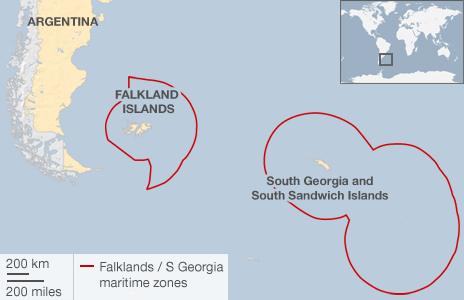Falklands referendum: Islanders vote on British status
- Published
The islanders are keen to send out a clear signal to Argentina and the rest of the world with their referendum this weekend
The people of the Falkland Islands have begun voting in a two-day referendum on whether to remain a British overseas territory.
Argentina has constantly reiterated its claims to the islands, 30 years after it was repelled by a British task force in a 74-day conflict.
The islanders decided to hold the vote in response to Argentine pressure for negotiations over sovereignty.
Some 1,672 British citizens - out of a population of about 2,900 - can vote.
Argentine President Cristina Fernandez de Kirchner has said the inhabitants' wishes are not relevant in what is a territorial issue.
Most Argentines regard the islands, which they call Las Malvinas, as Argentine and their recovery is enshrined in the national constitution.
Dick Sawle, a member of the island's legislative assembly, played a leading part in pushing for the vote.
He told the BBC's Andrew Marr Show he hoped the result would reaffirm the principle of self-determination and send a message to both the international community and to Argentines.
"I would hope that whilst the government of Argentina may not listen to us, I hope the people... will listen to us, because I think there are many people within Argentina who are not in tune with their government."
He rejected President Kirchner's suggestion they were an "implanted" population, saying the Falklands had been settled throughout history in the same way as South America, but with no indigenous population to displace.
Despite the clarity of the history, he added, there was the fundamental right to self-determination "to which no-one can attach conditions".
Sukey Cameron, UK representative of the Falkland Islands government, said the territory could become independent in the future.
"That may well happen in 50, 70, 100 years' time, but now we are very happy with our relationship as it stands with the UK," she told Murnaghan on Sky News.
Staff and customers at the Bittersweet Cafe in Stanley talk about being islanders
"There are some people on the island who may vote 'no' but voting 'no' isn't necessarily voting 'yes' to Argentina," she added.
BBC defence correspondent Caroline Wyatt, in Port Stanley, said in the cafes and shops of the Falklands capital there was no mistaking the sentiment - union flags fly everywhere from cars to bunting in the windows, and posters ask islanders to vote "yes" to staying British.
She said many people queuing at the capital's polling booths showed their British allegiance by dressing in the union flag.
Our correspondent added that mobile polling stations had been sent out to help the more isolated islanders cast their vote, overseen by an international observer to guard against vote tampering.
Julie Clarke, owner of the Bittersweet cafe in Port Stanley, said: "Without a shadow of a doubt, it'll be a big fat 'yes'.
"These are our islands, this is our home, and I think the rest of the world needs to hear us and see us for who we are."
Pam Devino, who runs a beauty salon, said: "Really, hopefully, that will get Argentina to back off, stop giving us so much hassle and it will let Britain know as well that we want to be British and part of them, and we're thankful for their support."
Falkland Islander Keith Grimmer added: "It's important to show Mrs Kirchner that we want to be British and not Argentine. It's cold here but it's going to be even colder for Mrs Kirchner. Yes is the answer."
The BBC's Alastair Leithead: "Even if there is a yes vote, the Argentines say it makes no difference at all"
Election observers from different countries are overseeing the vote, including representatives of Chile and Mexico - despite an Argentine request for Latin American countries not to take part.
Argentine forces invaded the Falkland Islands on 2 April 1982. The garrison of Royal Marines was overwhelmed and other British South Atlantic territories including South Georgia were also seized.
In two months of fighting, 255 British and about 650 Argentine servicemen were killed, along with three Falklands civilians, before Argentine forces surrendered.

The Falkland Islands and South Georgia and South Sandwich Islands are British Overseas Territories